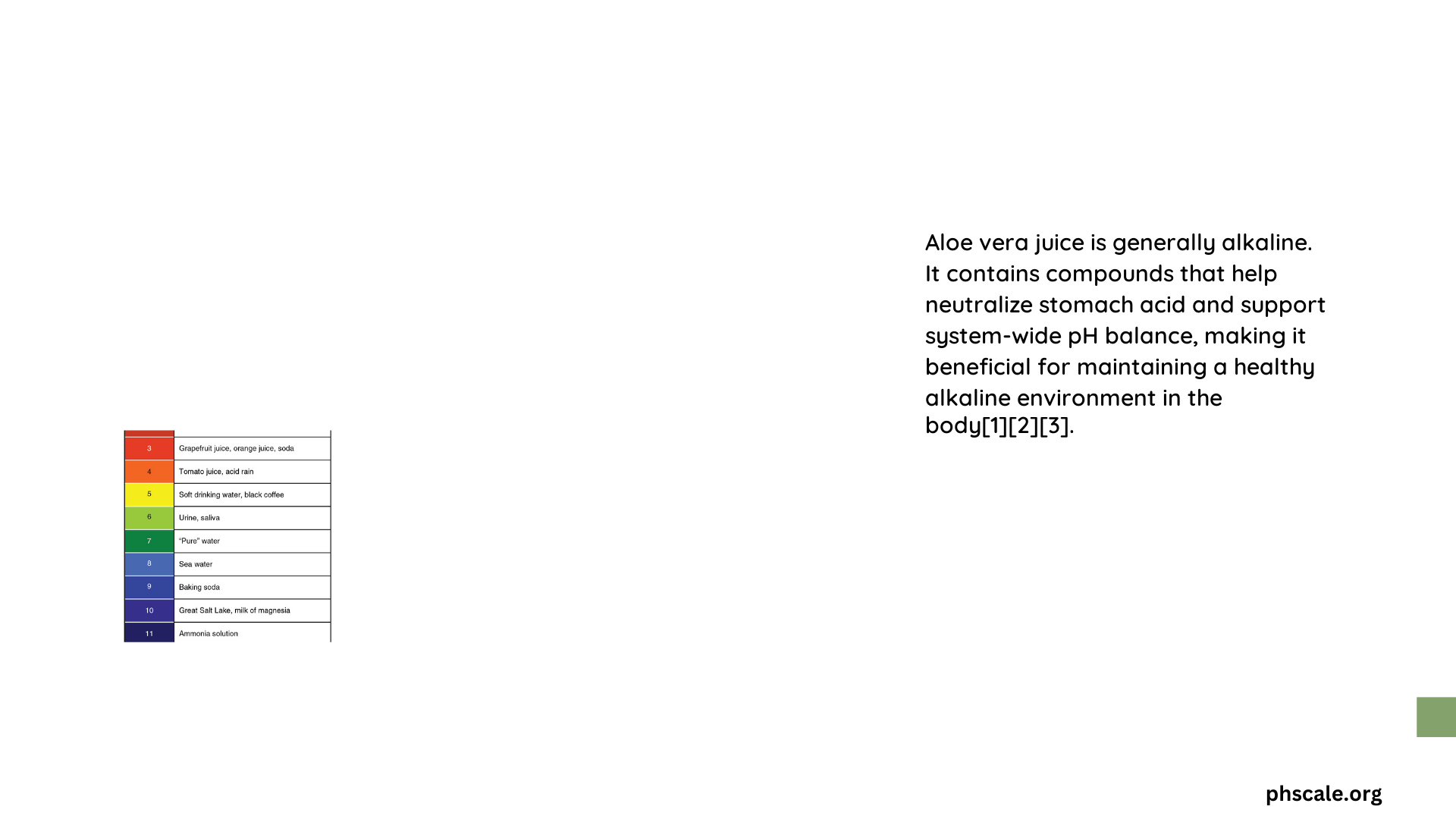Aloe vera juice, derived from the succulent plant, has gained popularity for its potential health benefits. However, there’s often confusion about its pH level and whether it’s acidic or alkaline. This article delves into the acidity of aloe vera juice, its effects on the body, and how it contributes to overall pH balance. We’ll explore the science behind its pH levels and clarify misconceptions about its acidic or alkaline nature.
What is the pH Level of Aloe Vera Juice?
Aloe vera juice is generally acidic, with a pH range typically falling between 4.5 and 5.5. This places it on the mildly acidic side of the pH scale. However, the exact pH can vary depending on factors such as processing methods and storage conditions.
- Pure aloe vera juice: pH 3.5 to 4.5
- Commercial aloe vera juice: pH 4.5 to 5.5
It’s worth noting that this pH range is close to the natural pH of human skin and hair, which contributes to its popularity in skincare and haircare products.
How Does Aloe Vera Juice Affect Body pH?

Despite its acidic nature, aloe vera juice can have alkalizing effects on the body:
- Digestive System Balance: Aloe vera helps maintain a balanced gut pH, crucial for proper digestion.
- System-Wide pH Regulation: It supports overall pH balance in the body, potentially counteracting excessive acidity.
- Antioxidant Properties: Contains vitamins that neutralize free radicals, indirectly supporting pH balance.
Can Aloe Vera Juice Help with Acid Reflux?
Yes, aloe vera juice can potentially help with acid reflux symptoms:
- It may reduce stomach acid production
- Soothes the esophagus and stomach lining
- Helps balance the digestive system’s pH
However, it’s essential to consult a healthcare professional before using aloe vera juice for acid reflux, as individual responses may vary.
What Are the Benefits of Aloe Vera Juice’s pH Level?
The mildly acidic nature of aloe vera juice offers several benefits:
- Skin Health:
- Matches skin’s natural pH
- Helps maintain skin barrier function
-
May improve skin hydration
-
Hair Care:
- Balances scalp pH
- Can reduce dandruff and itchiness
-
Promotes healthier hair growth
-
Digestive Health:
- Supports optimal digestive enzyme function
- May alleviate symptoms of indigestion
Does Processing Affect Aloe Vera Juice’s pH?
Yes, processing can influence the pH of aloe vera juice:
| Processing Method | Effect on pH |
|---|---|
| Cold-pressing | Minimal change |
| Heat processing | Slight increase in pH |
| Filtration | May remove some acidic compounds |
| Preservation | Can stabilize pH |
It’s important to note that while processing may slightly alter the pH, it generally remains within the acidic range.
How Does Storage Impact Aloe Vera Juice’s Acidity?
Proper storage is crucial to maintain the stability and pH of aloe vera juice:
- Refrigeration (4-8°C): Helps maintain pH stability
- Exposure to light: May cause slight pH fluctuations
- Age: Juice may darken over time, potentially affecting pH
- Container type: Glass or opaque containers can help preserve pH
To ensure the best quality and consistent pH, always follow the manufacturer’s storage recommendations.
Are There Any Risks Associated with Aloe Vera Juice’s Acidity?
While aloe vera juice is generally safe for most people, its acidity may pose some risks:
- Dental Health:
- Regular consumption may erode tooth enamel
-
Rinse mouth with water after drinking
-
Digestive Sensitivity:
- Some individuals may experience stomach discomfort
-
Start with small amounts to assess tolerance
-
Medication Interactions:
- May interact with certain medications due to its pH
- Consult a healthcare provider if taking medications
How Does Aloe Vera Juice Compare to Other Acidic Drinks?
Here’s a comparison of aloe vera juice’s pH with other common beverages:
| Beverage | Typical pH Range |
|---|---|
| Aloe Vera Juice | 4.5 – 5.5 |
| Orange Juice | 3.3 – 4.2 |
| Coffee | 4.8 – 5.1 |
| Green Tea | 7.0 – 10.0 |
| Cola | 2.5 – 3.5 |
As we can see, aloe vera juice is less acidic than many popular drinks, making it a gentler option for those concerned about acidity.
Can Aloe Vera Juice Be Made More Alkaline?
While aloe vera juice is naturally acidic, some people prefer to increase its alkalinity. Here are some methods:
- Add alkaline water
- Mix with green vegetable juices
- Blend with alkaline fruits like bananas or melons
- Incorporate alkaline minerals like calcium or magnesium
However, altering the pH may affect the juice’s natural properties and benefits, so it’s best to consume it in its natural form unless advised otherwise by a health professional.
In conclusion, while aloe vera juice is acidic, its pH level is relatively mild compared to many other beverages. Its ability to support overall pH balance in the body, coupled with its numerous health benefits, makes it a valuable addition to many people’s diets. As with any dietary change, it’s wise to consult with a healthcare provider, especially if you have specific health concerns or are taking medications.
References:
1. https://luminanceskincare.com/blogs/news/aloe-vera-water-balances-the-ph-of-your-skin-and-more
2. https://www.makingcosmetics.com/HUM-ALVE1X-01.html?lang=en_US
3. https://lilyofthedesert.com/blog/how-aloe-vera-helps-balance-ph-levels/
